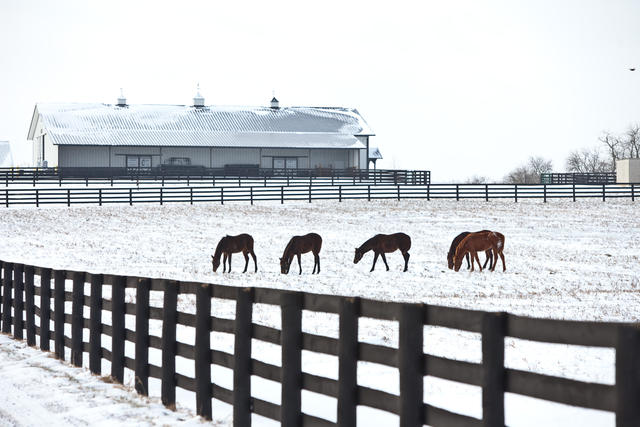Horse management tips for cold temperatures
Horse management tips for cold temperatures

LEXINGTON, Ky., (Jan. 23, 2014) – Bitter cold temperatures have been a theme this winter, and are now here again. Experts at the University of Kentucky College of Agriculture, Food and Environment offer tips for managing horses during extremely cold weather.
While the ideal time for cold weather preparation is in the fall, there are management tips recommended by experts to help keep your horses healthy now. According to Bob Coleman, extension horse specialist within UK’s Department of Animal and Food Sciences, horse owners should also think about preparing for acute versus chronic cold. Acute cold is found in the cold snaps that last for a short period of time. Chronic cold is the cold that takes hold and stays with a region for a much longer duration. Sometimes an acute situation can prove to be more dangerous to animals, he said, because they aren’t as used to the cold and owners might not be as well prepared as those in locations where intense cold is more typical and long-lasting.
Regardless of the type of cold present, horse owners should make sure animals have adequate shelter, water, dry bedding and feed, he said.
According to Coleman, digestion is one way horses help generate heat when it is cold. The average horse, with a lower activity level, should eat between 1.5 and 2 percent of its body weight in feed per day to maintain weight.
Feed requirements go up as temperatures drop, and horses use more calories to keep warm. Mature horses can, when adapted, handle a temperature of 5 degrees F, which is called the lower critical temperature, he said. When the temperature falls below this, the horse needs to increase heat production or reduce heat loss to maintain core body temperature. One way to do this is for the horse to eat more. A drop in temperature to minus 5 degrees will require an additional 15 percent more forage to provide the needed calories, meaning the horse needs to eat 2-3 more pounds of hay each day.
“As a horse owner, making sure there is some extra hay available will help your horses get through the short-term cold snaps. Long or more chronic exposure to cold will need some other management changes to meet the horse’s calorie needs,” Coleman said. “On the short-term, add more forage. But if forage supplies are limited, adding a concentrate feed to the diet may be needed.”
For mature horses at maintenance, good quality legume-grass mixed hay should be adequate, while young growing horses or broodmares in late gestation require a concentrate in their diets to meet the increased calorie needs. If an owner is adding concentrate for the first time, those additions should be made gradually to prevent digestive upsets.
Coleman said it’s also critically important that horses to have access to clean, unfrozen water to ensure that they eat adequate amounts of feed. Intake of water each day helps to reduce the risk of colic due to impaction. While this can be one of the most difficult and time-consuming aspects of winter horse management, its importance can’t be over-emphasized.
In addition, horses will need shelter to provide protection from the wind and any precipitation that may fall.
For horse owners who choose to use blankets, Coleman urged them to make sure those blankets are both wind and waterproof. A wet blanket equals a wet horse, and that wetness disrupts the coat’s ability to insulate the animal and can quickly lead to cold stress.
All horse owners should take extra time observing horses during cold snaps to make sure they are handling the temperatures well. This means checking on horses daily. Ones who are feeling the effects of the cold will need extra attention.
Coleman strongly recommended keeping horses out of pastures or paddocks with ponds or other open water sources. There are cases each winter of horses falling through ice and into a pond.
Ag Equine Programs Extension Weather

